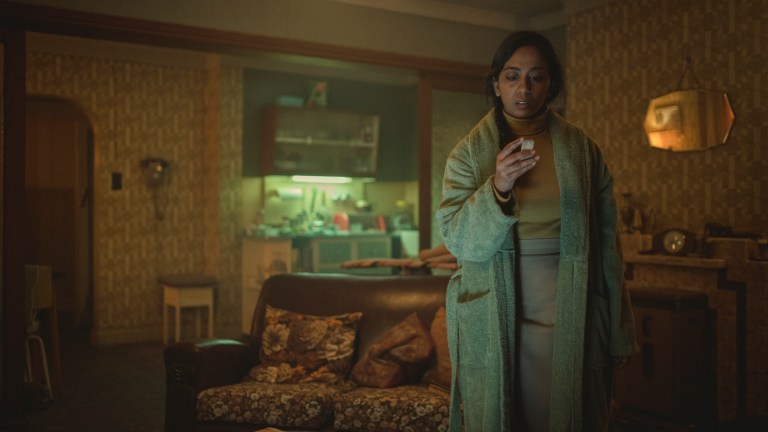Black Mirror: Demon 79 Has a Hidden Backstory That Explains the Ending
Demon 79 star Anjana Vasan shares a theory that makes the ending of her Black Mirror episode even clearer.

This article contains spoilers for the Black Mirror season 6 episode “Demon 79.”
When Anjana Vasan (We Are Lady Parts) signed on to star in the Black Mirror episode “Demon 79,” it wasn’t entirely clear whether it would even exist under the Black Mirror banner. Black Mirror creator Charlie Brooker and co-writer Bisha K. Ali began the project as an exercise in writing “Red Mirror,” a companion piece for Brooker’s long-running sci-fi anthology in which the usual rules needn’t apply.
“We knew that it was a bit longer than a [usual Black Mirror] episode. We didn’t even know at the start if there were going to be other episodes or if we were just a one-off special,” Vasan says.
Operating under cloak and dagger secrecy is something that any actor must get used to when working on Black Mirror – particularly when it’s an entry that seeks to rip up the show’s traditional rulebook like Demon 79 does. As its title suggests, Demon 79 takes place in a fictional English hamlet in 1979. Vasan stars as Nida, a mild-mannered Indian-British woman struggling to earn respect from her racist peers in an increasingly intolerant political environment. One day, Nida comes across a cursed talisman that unleashes the demon Gaap (Paapa Essiedu). Gaap informs Nida that she must kill three innocent people within three days or else usher in the apocalypse.
While Vasan grew comfortable with not knowing everything about Demon 79 or its place within the Black Mirror canon, there’s one aspect of the story that she has more information on.
“I asked them about the question mark over [Nida’s] mother immediately. That was the very first question I asked Charlie and Bisha.”
The “question mark” over Nida’s mother refers to the status of her mental health. When Gaap first emerges from the talisman in his demonic form to meet Nida, she glances over at a photo of her deceased mother and remarks upon how people thought her “mum was crazy.” The episode never reveals why “people” might have thought that. Every detail about Nida’s mom, including why she may have been deemed as crazy is left up to the viewer’s imagination. Ultimately, it was left up to Vasan’s imagination as well. And she honed in on an answer that would better explain her own character and even better explain the episode’s ending and themes.
“What she says is that ‘people said my mom was mad.’ I wanted to clue in to that, more than the fact that she might have been,” Vasan says.
You see, people do indeed say all sorts of things and it doesn’t always mean those things are true. Nida would know that better than anyone. Her co-workers complain that her lunches stink up the break room when in reality everyone knows that the sweet floral fragrance of biryani rules.
“Nida is someone who is diminished daily by the world around her,” Vasan says. “She really softens the edges of herself and her personality. I wondered what it might be like if her mom was someone who may or may not have had any kind of mental health issues, but was loud and eccentric or didn’t quite assimilate in a way that was ‘acceptable’ or the norm and was maybe kind of looked at weirdly by society.”
The events of Demon 79 are so fantastical that they present only two options for the viewer familiar with the usual rules of Black Mirror. Either there is room for real demonic evil in the this universe or Nida is quite simply crazy. By Vasan accepting that hidden backstory about Nida’s mom early on, only the first option makes sense.
“The question mark over the whole story is ‘Is she insane? Is this her imagination? Or is this real?’ For me, it was more interesting to imagine that people were saying that she was mad, but that wasn’t necessarily the truth.”
Nida isn’t crazy in Demon 79. The world that lets bigotry and fear escalate into an existence-ending nuclear holocaust is.
All five episodes of Black Mirror season 6 are available to stream on Netflix.
